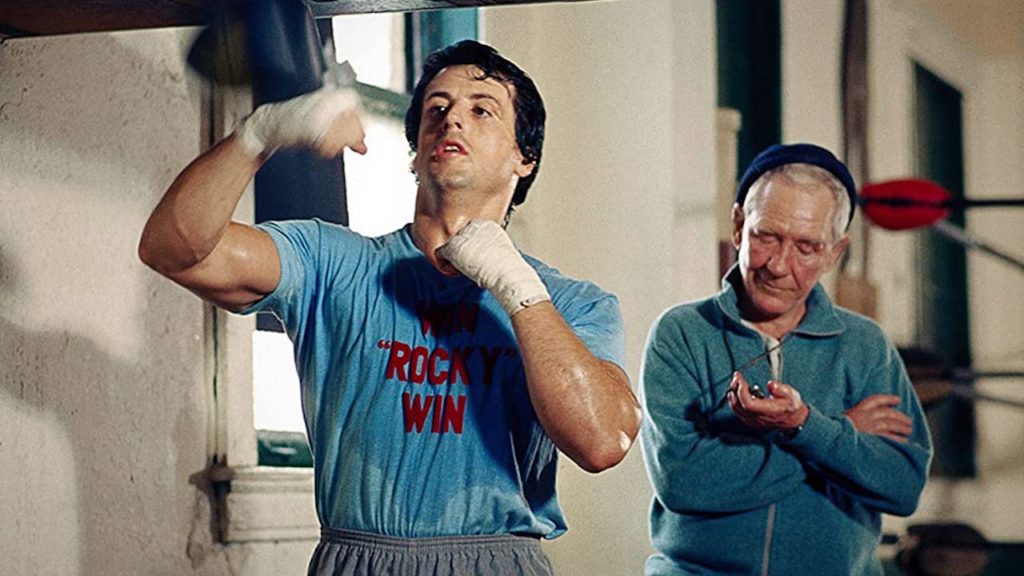
Rocky is a 1976 American sports drama film directed by John G. Avildsen and written by and starring Sylvester Stallone. It is the first installment in the Rocky franchise. It also stars Talia Shire, Burt Young, Carl Weathers, and Burgess Meredith. In the film, Rocky Balboa (Stallone), an uneducated, small-time club fighter and debt collector gets an unlikely shot at the world heavyweight championship held by Apollo Creed (Weathers).
Rocky entered development in March 1975, after Stallone wrote the screenplay in three days. It entered a complicated production process after Stallone refused to allow the film to be made without him in the lead role; United Artists eventually agreed to cast Stallone after he rejected a six figure deal for the film rights. Principal photography began in January 1976, with filming primarily held in Philadelphia; several locations featured in the film, such as the Rocky Steps, are now considered cultural landmarks.
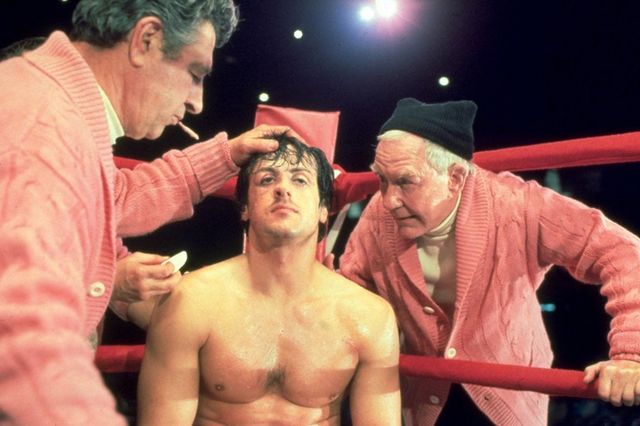
With an estimated production budget of under $1 million, Rocky popularized the rags to riches and American Dream themes of sports dramas which proceeded the film.
Rocky was premiered in New York City on November 21, 1976, and was theatrically released in the United States by United Artists on December 3. The film received critical acclaim; among other accolades, it received ten Academy Award nominations and won three, including Best Picture. Stallone’s performance was also widely praised, and began his rise as a major film star.[5] A sleeper hit, it grossed $225 million worldwide, making it the highest-grossing film of 1976. Considered one of the greatest sports films ever made, Rocky was selected by the Library of Congress for preservation in the United States National Film Registry for being “culturally, historically or aesthetically significant”. The sequel, Rocky II, was released in 1979.
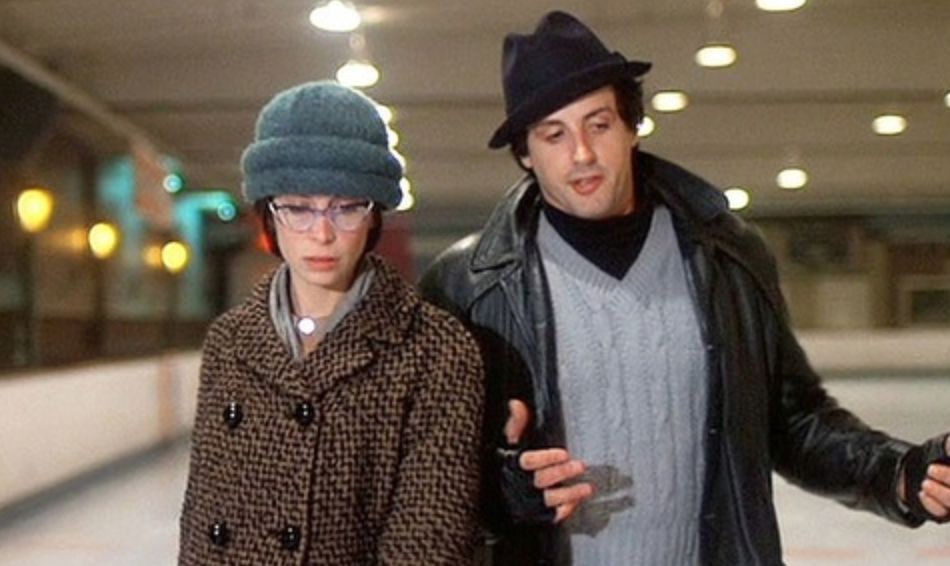
Plot.
In 1975, the heavyweight boxing world champion, Apollo Creed, announces plans to hold a title bout in Philadelphia during the upcoming United States Bicentennial. However, he is informed five weeks from the fight date that his scheduled opponent Mac Lee Green is unable to compete due to an injured hand. With all other potential replacements booked up or otherwise unavailable, Creed decides to spice things up by giving a local contender a chance to challenge him. Creed selects Rocky Balboa, an Italian journeyman southpaw boxer who fights primarily in small gyms and works as a collector for a loan shark. Rocky meets with promoter George Jergens assuming that Creed is seeking local sparring partners. Reluctant at first, Rocky eventually agrees to the fight which will pay him $150,000. Rocky undergoes several weeks of unorthodox training, such as using sides of beef as punching bags. Rocky is later approached by Mickey Goldmill, a former bantamweight fighter who turned trainer and whose gym Rocky frequents, about further training.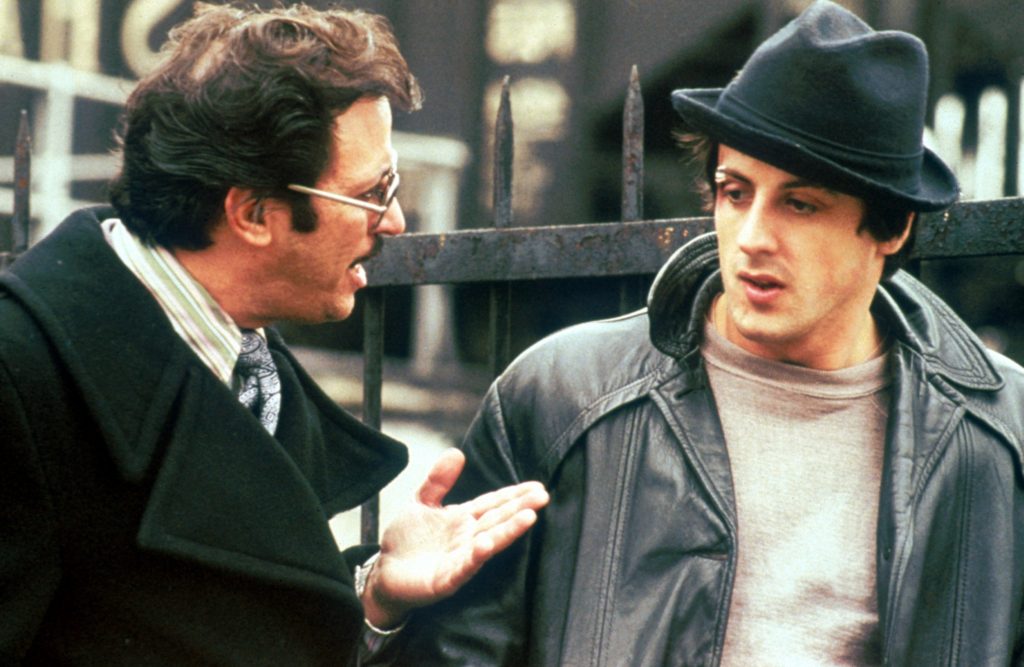
Rocky is not willing initially, as Mickey has not shown much interest in helping him before and sees him as a wasted talent, but eventually Rocky accepts the offer.
Rocky begins to build a romantic relationship with Adrian Pennino, who is working part-time at the J&M Tropical Fish pet shop. Adrian’s brother and Rocky’s best friend, Paulie, helps Rocky get a date with his sister and offers to work as a corner man with him for the fight. Paulie becomes jealous of Rocky’s success, but Rocky placates him by agreeing to advertise the meat packing business where Paulie works as part of the upcoming fight. The night before the fight, a sleepless Rocky visits the Philadelphia Spectrum and begins to lose confidence. He confesses to Adrian that he does not believe he can win, but strives to go the distance against Creed, which no other fighter has done, to prove himself to everyone; if he can go the distance, he will not be just “another bum from the neighborhood.”
RELATED:
Rocky II (1979) Biography, Plot, Writing, Filming, Box office, Scene.
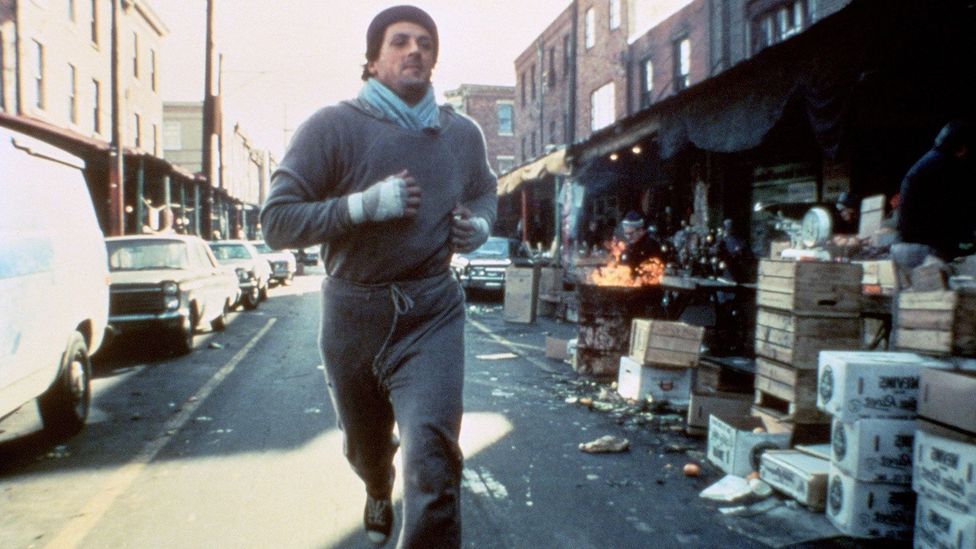
Development and writing.
Sylvester Stallone wrote the screenplay for Rocky in three and a half days, shortly after watching the championship match between Muhammad Ali and Chuck Wepner that took place at Richfield Coliseum in Richfield, Ohio, on March 24, 1975. Wepner was TKO’d in the 15th round of the match by Ali, with few expecting him to last as long as he did. Despite the match motivating Stallone to begin work on Rocky, he has denied Wepner provided any inspiration for the script. Other inspiration for the film may have included characteristics of real-life boxers Rocky Marciano and Joe Frazier, as well as Rocky Graziano’s autobiography Somebody Up There Likes Me and the movie of the same name. Wepner sued Stallone who eventually settled for an undisclosed amount. Henry Winkler, Stallone’s co-star in The Lords of Flatbush who then broke out as Arthur Fonzarelli on ABC’s Happy Days, said he had taken the script to executives at the network. They expressed interest in turning it into a made-for-television movie and actually bought the script but insisted that someone else re-write it. Upon hearing the news, Stallone begged Winkler not to let ABC change writers, so Winkler went back to the executives and offered to return the money in exchange for the rights.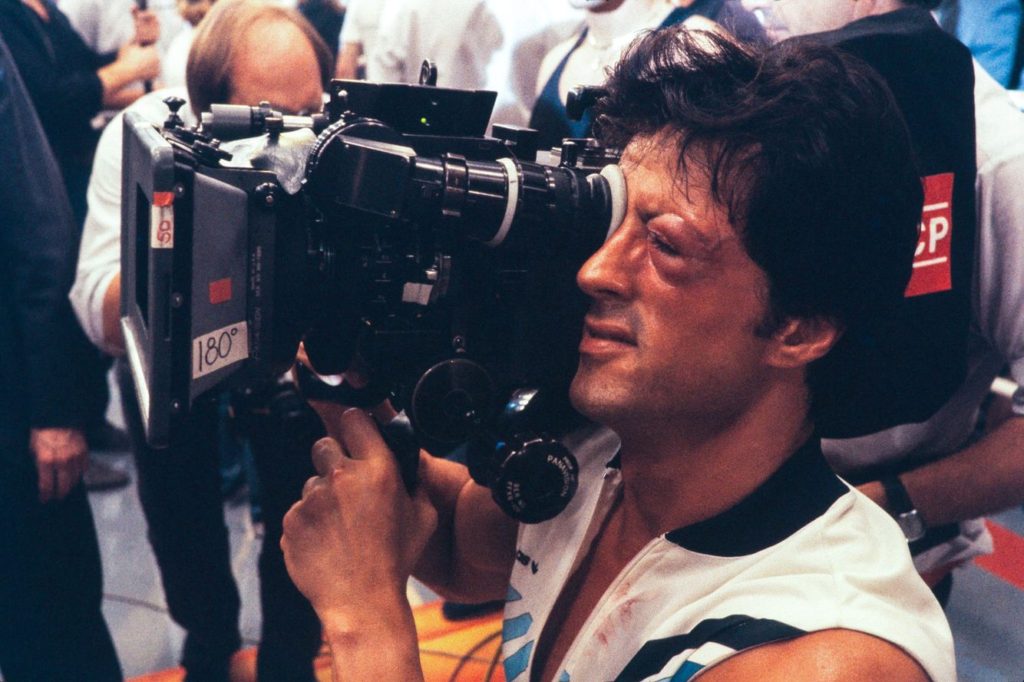
While ABC refused at first, Winkler said he was able to use his status as one of its biggest stars at the time to convince them to sell the rights back.
At the time, Film Artists Management Enterprises (FAME), a joint venture between Hollywood talent agents Craig T. Rumar and Larry Kubik, represented Stallone. He submitted his script to Rumar and Kubik, who immediately saw the potential for it to be made into a motion picture. They shopped the script to various producers and studios in Hollywood but were repeatedly rejected because Stallone insisted that he be cast in the lead role. Eventually, they secured a meeting with Winkler-Chartoff productions. After repeated negotiations with Rumar and Kubik, Winkler-Chartoff agreed to a contract for Stallone to be the writer and also star in the lead role for Rocky.
United Artists liked Stallone’s script and viewed it as a vehicle for a well-established star like Robert Redford, Ryan O’Neal, Burt Reynolds, or James Caan. Stallone’s agents insisted that Stallone portray the title character, to the point of issuing an ultimatum. Stallone later said that he would never have forgiven himself had the film become a success with somebody else in the lead.

Pre-production.
Although Chartoff and Winkler were enthusiastic about the script and the idea of Stallone playing the lead character, they were hesitant about having an unknown headline the film. The producers also had trouble casting other major characters in the story, with Apollo Creed and Adrian cast unusually late by production standards. Real-life boxer Ken Norton was initially sought for the role of Apollo Creed, but he pulled out and the role was ultimately given to Carl Weathers. Norton, upon whom Creed was loosely based, fought Muhammad Ali three times. According to The Rocky Scrapbook, Carrie Snodgress was originally chosen to play Adrian, but a money dispute forced the producers to look elsewhere. Susan Sarandon auditioned for the role but was deemed too pretty for the character. After Talia Shire’s ensuing audition, Chartoff and Winkler, and director John Avildsen, insisted that she play the part. Boxer Joe Frazier has a cameo appearance in the film. Outspoken boxer Muhammad Ali, who fought Frazier three times, influenced the character of Apollo Creed.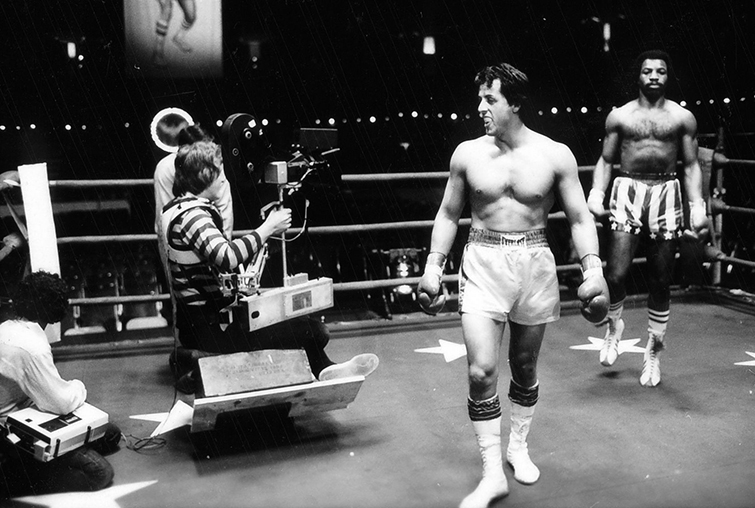
During the 49th Academy Awards ceremony in 1977, Ali and Stallone staged a brief comic confrontation to show the film did not offend Ali. Some of the plot’s most memorable moments—Rocky’s carcass-punching scenes and Rocky running up the steps of the Philadelphia Museum of Art as part of his training regimen—are taken from the real-life exploits of Joe Frazier, for which he received no credit.
Because of the film’s comparatively low budget, members of Stallone’s family played minor roles. His father rings the bell to signal the start and end of a round; his brother Frank plays a street corner singer, and his first wife, Sasha, was stills photographer. Other cameos include former Philadelphia and then Los Angeles television sportscaster Stu Nahan playing himself, alongside radio and TV broadcaster Bill Baldwin; and Lloyd Kaufman, founder of the independent film company Troma, appearing as a drunk. Diana Lewis, then a news anchor in Los Angeles and later in Detroit, has a minor scene as a TV news reporter.
RELATED:
Sylvester Stallone Biography – Age, Wife, Films, Children – who is Rocky in the movies?
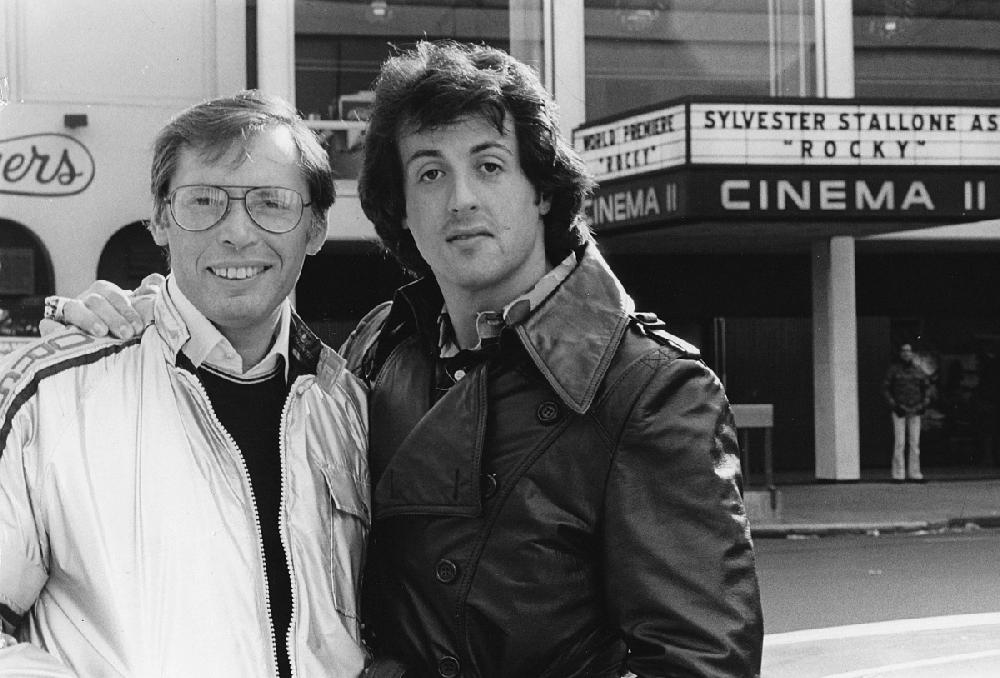
Filming.
Principal photography for Rocky began on January 9, 1976. Filming took place primarily throughout Philadelphia, with a few scenes being shot in Los Angeles. Inventor Garrett Brown’s new Steadicam was used to accomplish smooth photography while running alongside Rocky during the film’s Philadelphia street training sequences and the run up the Art Museum’s flight of stairs, now colloquially known as the Rocky Steps. It was also used for some shots in the fight scenes and can be seen at the ringside during some wide shots of the final fight. Rocky is often erroneously cited as the first film to use the Steadicam, although it was actually the third, after Bound for Glory and Marathon Man. Certain elements of the story were altered during filming. The original script had a darker tone: Mickey was portrayed as racist, and the script ended with Rocky throwing the fight after realizing he did not want to be part of the professional boxing world after all. Both Stallone and Weathers suffered injuries during the shooting of the final fight;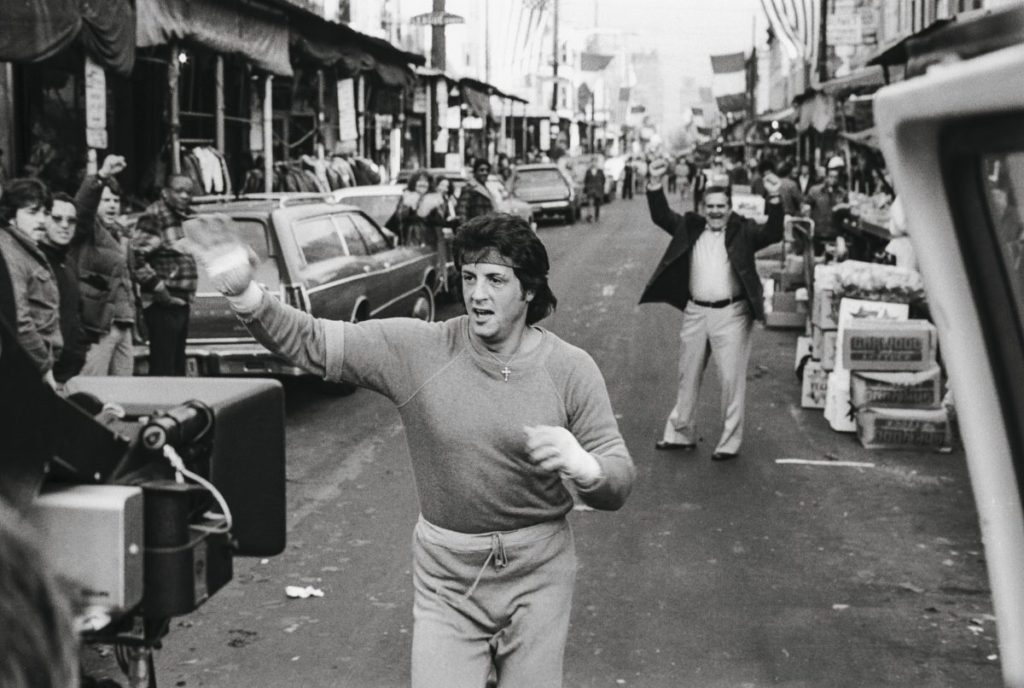
Stallone suffered bruised ribs and Weathers suffered a damaged nose, the opposite injuries of what their characters had.
The first date between Rocky and Adrian, in which Rocky bribes a janitor to allow them to skate after closing hours on a deserted ice skating rink, was shot that way only because of budgetary pressures. This scene was originally scheduled to be shot in a skating rink during regular business hours. However, the producers decided they could not afford to hire the hundreds of extras that would have been necessary for that scene.
The poster seen above the ring before Rocky fights Apollo Creed shows Rocky wearing red shorts with a white stripe when he actually wears white shorts with a red stripe. When Rocky points this out, he is told that “it doesn’t really matter, does it?” According to director Avildsen’s DVD commentary, this was an actual mistake made by the props department that they could not afford to rectify, so Stallone wrote the brief scene to ensure the audience did not see it as a goof.

